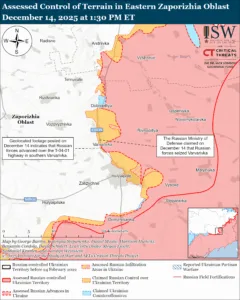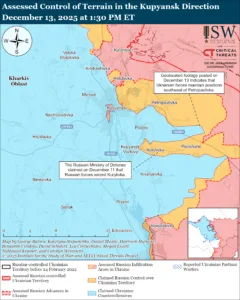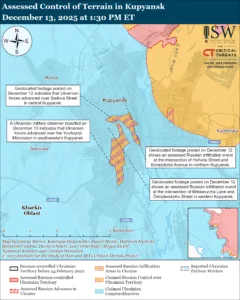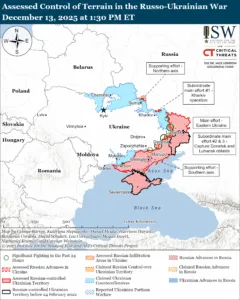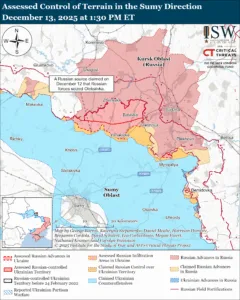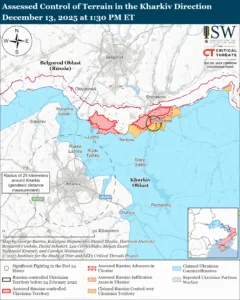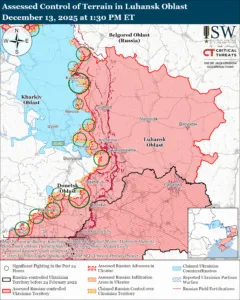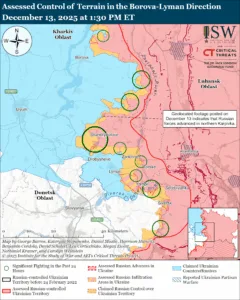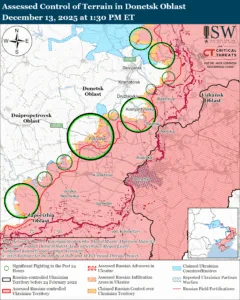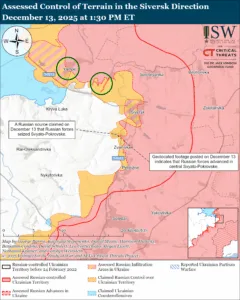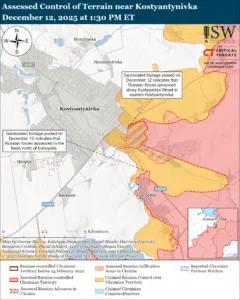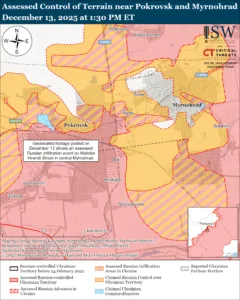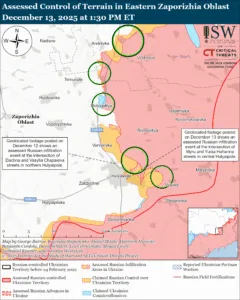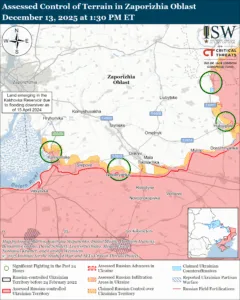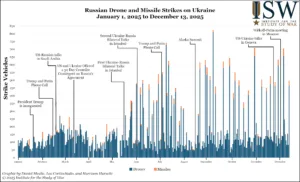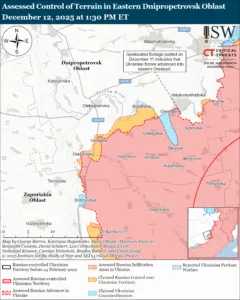Russian Offensive Campaign Assessment

About this product line
ISW’s Russia and Ukraine team produces the maps and analysis of record of the war in Ukraine. The Russian Offensive Campaign Assessment provides a synthetic running intelligence estimate of Putin’s political and military objectives in Ukraine and the design, prosecution, and outcomes of Russia’s war effort. ISW has published this update daily since Russia’s full-scale invasion of Ukraine in February 2022. Each update includes an assessment of the latest battlefield changes at the operational and tactical levels of war as well as an updated strategic assessment and forecast of the war’s trajectory along with numerous supporting maps produced by ISW’s Geospatial Intelligence Team. This product line also includes prominent warning alerts.
The first two years of this product line also included detailed insights into Russian supporting efforts in Ukraine including force generation efforts, technological adaptation, Russian activities in occupied Ukraine, Russian information operations, and Russian efforts to de facto annex Belarus. In April 2024, ISW launched two new product lines to explore these Russian activeies in occupied Ukraine and Russian force generation efforts in greater depth. Insights into these topics since April 2024 can be found at the links below.
Russian Offensive Campaign Assessment
Research
Update
Dec 14, 2025
RUSSIA & UKRAINE
UKRAINE
Assessed Control of Terrain in the Russo-Ukrainian War, December 14, 2025 at 1:30 PM ET
RUSSIA & UKRAINE
UKRAINE
Assessed Control of Terrain in the Sumy Direction, December 14, 2025 at 1:30 PM ET
RUSSIA & UKRAINE
UKRAINE
Assessed Control of Terrain in the Kharkiv Direction, December 14, 2025 at 1:30 PM ET
RUSSIA & UKRAINE
UKRAINE
Assessed Control of Terrain in Luhansk Oblast, December 14, 2025 at 1:30 PM ET
RUSSIA & UKRAINE
UKRAINE
Assessed Control of Terrain in Donetsk Oblast, December 14, 2025 at 1:30 PM ET
RUSSIA & UKRAINE
UKRAINE
Assessed Control of Terrain near Kostyantynivka, December 14, 2025 at 1:30 PM ET
RUSSIA & UKRAINE
UKRAINE
Assessed Control of Terrain in the Pokrovsk Direction, December 14, 2025 at 1:30 PM ET
RUSSIA & UKRAINE
UKRAINE
Assessed Control of Terrain in Eastern Zaporizhia Oblast, December 14, 2025 at 1:30 PM ET
RUSSIA & UKRAINE
UKRAINE
Assessed Control of Terrain in Zaporizhia Oblast, December 14, 2025 at 1:30 PM ET
RUSSIA & UKRAINE
UKRAINE
Assessed Control of Terrain in the Kherson Direction, December 14, 2025 at 1:30 PM ET
Update
Dec 13, 2025
RUSSIA & UKRAINE
UKRAINE
Assessed Control of Terrain in the Kupyansk Direction, December 13, 2025 at 1:30 PM ET
RUSSIA & UKRAINE
UKRAINE
Assessed Control of Terrain in Kupyansk, December 13, 2025 at 1:30 PM ET
RUSSIA & UKRAINE
UKRAINE
Assessed Control of Terrain in the Russo-Ukrainian War, December 13, 2025 at 1:30 PM ET
RUSSIA & UKRAINE
UKRAINE
Assessed Control of Terrain in the Sumy Direction, December 13, 2025 at 1:30 PM ET
RUSSIA & UKRAINE
UKRAINE
Assessed Control of Terrain in the Kharkiv Direction, December 13, 2025 at 1:30 PM ET
RUSSIA & UKRAINE
UKRAINE
Assessed Control of Terrain in the Luhansk Oblast, December 13, 2025 at 1:30 PM ET
RUSSIA & UKRAINE
UKRAINE
Assessed Control of Terrain in the Borova-Lyman Direction, December 13, 2025 at 1:30 PM ET
RUSSIA & UKRAINE
UKRAINE
Assessed Control of Terrain in the Donetsk Oblast, December 13, 2025 at 1:30 PM ET
RUSSIA & UKRAINE
UKRAINE
Assessed Control of Terrain in the Siversk Direction, December 13, 2025 at 1:30 PM ET
RUSSIA & UKRAINE
UKRAINE
Assessed Control of Terrain in Pokrovsk and Myrnohrad, December 13, 2025 at 1:30 PM ET
RUSSIA & UKRAINE
UKRAINE
Assessed Control of Terrain in Eastern Zaporizhia Oblast, December 13, 2025 at 1:30 PM ET
RUSSIA & UKRAINE
UKRAINE
Assessed Control of Terrain in Zaporizhia Oblast, December 13, 2025 at 1:30 PM ET
RUSSIA & UKRAINE
UKRAINE
Assessed Control of Terrain in the Kherson Direction, December 13, 2025 at 1:30 PM ET
RUSSIA & UKRAINE
UKRAINE
Russian Drone and Missile Strikes on Ukraine, January 1, 2025 to December 13, 2025
Update
Dec 12, 2025
RUSSIA & UKRAINE
UKRAINE
Assessed Control of Terrain near Kostyantynivka, December 12, 2025 at 1:30 PM ET
RUSSIA & UKRAINE
UKRAINE
Assessed Control of Terrain in the Eastern Dnipropetrovsk Direction, December 12, 2025
Geospatial IntelligenceRussia & Ukraine
Ukraine
Updated
Nova Kakhovka Dam Flooding as of June 9, 2023
Geospatial IntelligenceRussia & Ukraine
Ukraine
Updated
Interactive Time-lapse: Russia’s War in Ukraine
Russia & Ukraine
Ukraine
Assessed Control of Terrain in the Russo-Ukrainian War, December 14, 2025 at 1:30 PM ET
Russia & Ukraine
Ukraine
Assessed Control of Terrain in the Sumy Direction, December 14, 2025 at 1:30 PM ET
Russia & Ukraine
Ukraine
Assessed Control of Terrain in the Kharkiv Direction, December 14, 2025 at 1:30 PM ET
Russia & Ukraine
Ukraine
Assessed Control of Terrain in Luhansk Oblast, December 14, 2025 at 1:30 PM ET
Methodology
Analytic
ISW does not receive any classified material from any source, uses only publicly available information, and draws extensively on Russian, Ukrainian, and Western reporting and social media as well as commercially available satellite imagery and other geospatial data as the basis for these reports. References to all sources used are provided in the endnotes of each update. ISW does not forecast Ukrainian actions, collect on Ukrainian activities beyond Ukrainian officials’ public statements and Russian or public reporting on Ukrainian activities, or map Ukrainian units’ locations.
Russian Offensive Campaign Assessment
FAQ
ISW does not receive any classified material from any source, uses only publicly available information, and draws extensively on Russian, Ukrainian, and Western reporting and social media as well as commercially available satellite imagery and other geospatial data as the basis for these reports. References to all sources used are provided in the endnotes of each update.
ISW does not gather information from human sources. References to all sources used are provided in the endnotes of each update.
Please contact [email protected]
Please contact [email protected]







